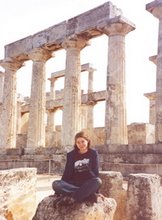Sometimes archaeology is not entirely logical. Since many archaeological projects in the Mediterranean are run by American and European universities, and since they therefore must be done during these universities' summer vacations, most projects are done during the summer months, the hottest time of the year. And it gets insanely hot in Greece, which means that if you’re working outside all day like we were, it’s a good idea to get most of your work done before the hottest part of the day.
All of this means that our work day started at 6:00 AM, and I needed to be up at 5:15 in order to get to the site on time. Now, I have never been a morning person, which made this a truly painful experience. However, the first few hours of work were in fact always the most pleasant, once the shock of waking up wore off. I got to watch the sun rise over the mountains every day, and the Greek countryside in the early morning is truly beautiful. By about 9:00 AM, however, the magic was gone and the heat really kicked in.
We were working in a rural part of Greece, and the land was primarily agricultural. We spent our time in olive groves, apricot orchards, vineyards, and open fields. Once we even surveyed in a field that was home to about 2 dozen beehives! The beekeeper met us in the field before sunrise, while the bees were still asleep, and gave us some protective clothing, which consisted of long-sleeved shirts and a straw hat...but, as it turns out, the bees didn't seem to mind our presence at all, and went about their pollen-gathering business.
Occasionally, we wound up close to the village and found ourselves surveying in someone’s backyard, which could be a little awkward. While most of the locals were fine with what we were doing as once we explained it to them, occasionally they could get very angry (understandably so, as we were in effect tresspassing on their property).
We ate lunch in the field at 11:30, and work stopped at 1:30. The project followed the Mediterranean custom of the siesta, or afternoon break, essential in such a hot climate. We had the afternoons free from 1:30 until 5:00 or 6:00. Most often we’d either nap or head to the beach, or both.
Ah, the beach. Archaeologists are only being somewhat facetious when they tell you that the most important factor to consider when choosing a site to study is its proximity to the beach. There’s really nothing like a dip in the ocean after a long, sweaty day’s work.
Kiato’s beach is a rocky beach, but the water is shallow, warm, and relatively clean. On a clear day, you can see across the Corinthian gulf to the mountains of Boeotia. The waterfront is lined with cafes and restaurants, which provide customers with beach chairs and shade. We would gather every afternoon at one particular spot, an Italian restaurant, which had been the prefered gathering spot of project archaeologists for years, for reasons I still don’t entirely understand….the food was bad, the service was worse, and they made weak frappés (the prefered summer drink of Greeks- Nescafe whipped into a foam, then mixed with milk, sugar and ice. Pretty vile, but hey, you gotta get your caffeine somehow). However, the poor food and service ensured that the place was almost always empty, with plenty of beach chairs and umbrellas waiting for us.
After siesta, we would reconvene in the apothiki (pottery shed) for afternoon work. For student volunteers, this meant washing the pottery that they had gathered that day. For staff, this time was spent downloading data from equipment, inventorying artifacts, and inputting forms into the database. In the beginning of the season, when the work load was still small, this was followed by a beer or two at the local café before dinner.
We ate dinner at 8:00. This was the main social event of the day, when everyone could gather to relax and talk, and drink, and maybe cause some mischief. Sometimes dinner was followed by a game of volleyball or soccer, sometimes an impromptu dance party, while sometimes the evening was pretty laid back, but there was always plenty of beer, and we always stayed up much later than most reasonable people would if they had to get up at 5:15 the next morning. And so forth, for 4 weeks.
Next: Field trips- Stymphalos, Nemea, Nafplio.
See the other installments in this series:
- Part 1: Finally, Greece! (intro)
- Part 2: Greece (about the project)
- Part 4: Greek Wine, Rose Jam, and Pigs: Travel in the Peloponnese











No comments:
Post a Comment